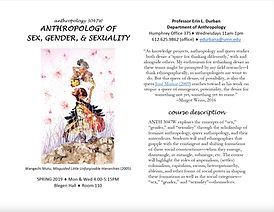
Teaching
Welcome! I have been teaching for two decades, with pedagogical experience in four U.S. public universities and social justice movements. This includes significant experience with online and hybrid teaching. I teach college courses in feminist studies, queer studies, trans* studies, critical disability studies, critical ethnic studies, and anthropology. I have also worked on curriculum committees in women's, gender, and sexuality studies, anthropology, and critical disability studies.
> Meritorious Graduate Teaching Award
> Grantee: Inclusive, Accessible, and Universal
Designs for Learning
> Certificate in College Teaching
> Professional Development Workshops:
Anti-Racist Feminist Pedagogy
College Writing
Online Pedagogy
Teaching with Access and Inclusion
Teaching with Archive Collections
Training
Courses
Following is a list of undergraduate and graduate courses that I have taught, excluding directed readings and courses for which I served as teaching assistant. Below that list are course descriptions for courses I developed or reimagined.
Introductory Courses:
INDV 102: Gender in Contemporary Society
INDV 102: Sex, Health, and AIDS
ANTH 1003W: Understanding Cultures
WGS 120: Gender, Sex, and Power
WGS 292: Introduction to LGBT/Queer Studies
GWS 200: Feminist and Queer Anthropology
GWS 240: Gender in a Transnational World
Upper-Division:
ANT 291: Undergraduate Teaching Experience in Anthropology
ANTH 3047W: Anthropology of Sex, Gender, and Sexuality
GLOS 3900/5900: Global LGBTQI Studies: Homophobias, Homonationalisms, & Human Rights
GLOS 3900/5900: Accounting for Human Rights
ANTH 4013: Senior Thesis Capstone
ANTH 4035: Ethnographic Research Methods
Graduate:
WGS 392: Queer and Trans* Theories
ANTH 8002: Contemporary Ethnographic Theory and Practice
ANTH 8810: Crip Times: Critical Disability Studies Now
Crip Times:
Critical Disability Studies Now
Critical disability studies offers theories and praxis drawn from disability justice, necessary for living in these pandemic “crip times” (McRuer 2018) of intensified immobilities and exacerbated socioeconomic inequalities. This graduate seminar centers scholarship about the present moment and recent past in critical disability studies that analyzes ableism in relationship to racism, settler colonialism, heteropatriarchy, capitalism, militarization, and empire. We explore topics such as normativity, debility, disposability, access, chronicity, futurity, illness, madness, toxicity, immunity, violence, and cure.

Global LGBTQI Studies: Homophobias, Homonationalisms, & Human Rights
This interdisciplinary course covers key concepts and debates in Lesbian, Gay, Bisexual, Transgender, Queer, and Intersex (LGBTQI) Studies using intersectional and transnational frameworks of analysis attentive to racism, (settler) colonialism, imperialism, and capitalism. Topics include tourism, migration, health, human rights, art and cultural production. Rather than being an introduction to LGBTQI cultures in different regions of the world, this course exposes students to critical scholarship about the production and circulation of Western identity categories and politics and to forms of activism that go beyond state recognition of LGBTQI identities.

Accounting for Human Rights
This course focuses on critical issues and key debates about knowledge production by human rights practitioners and scholars. What decisions go into researching and representing problems in human rights? Can human rights be quantified? In what ways are universal indicators of human rights useful, and what dynamics of violence do they obscure or perpetuate? The course investigates these questions and others related to “accounting” and regimes of accountability in human rights.
Accounting is a practice associated with finance and often perceived to be the realm of financial experts like accountants. This course explores accounting in a much broader sense, as “complex performative representational practices…deployed to create, sustain, or transform social relations” (Miranda Joseph 2014, x). Accounting is a core technology of biopolitical governmentality essential to human rights that is fundamentally concerned with modern power and populations. We will explore many modes of accounting for human rights over the course of the semester.

Anthropology of Sex,
Gender, and Sexuality
ANTH 3047W explores the concepts of “sex,” “gender,” and “sexuality” through the scholarship of feminist anthropology, queer anthropology, and their antecedents. Students read ethnographies that grapple with the contingent and shifting formations of these social constructions—when they emerge, disentangle, re-entangle, submerge, etc. The course highlights the roles of imperialism, (settler) colonialism, capitalism, racism, heteropatriarchy, ableism, and other forms of social power in shaping these formations as well as the social categories— “sex,” “gender,” and “sexuality”—themselves.

Queer and Trans* Theories
In the late twentieth century, activist scholars theorized the material conditions of same-sex desires and sexuality, sex and gender transitions, gender and sexual (non)normativity, and—more generally—the relationships between sex, gender, and sexuality. Two interrelated strands of theory—queer theory and transgender theory—developed from their conversations and debates. It would be impossible for this course to cover the “cannon” for even one of these literatures in the short span of a
semester, so we read selections and talk about the intellectual and political projects of each.

Ethnographic Research Methods
The practice of ethnography has been central to anthropology for the last century, and it has been taken up in academic research more broadly. Ethnographic fieldwork—participant observation, interviewing, mapping social relations, and more—generates the data through which we learn about our social world. Ethnography is often the ground on which researchers make broad theoretical claims about social power and daily life. It makes little sense, then, that ethnographic methods are often understood as individual trial-by-fire, as an esoteric rite of passage for a budding anthropologist, which cannot be taught, only experienced and overcome. While each ethnographer does negotiate her own craft “in the field,” this class argues that ethnographic methods and epistemologies must be explicitly taught and discussed.
This course offers a hands-on introduction to the practicalities of ethnographic fieldwork: articulating a research problem, framing a field site, techniques of participant observation and interviewing, taking field notes, analyzing data, and communicating our research to others in writing, film, and performance. We give detailed attention to a field research proposal to be designed in stages by each student. Field research allow us to learn about the mechanics of fieldwork; ethical issues; problems related to representation, power, and subjectivity; and the mutual imbrication of methodology, theory, and practice in anthropology.
